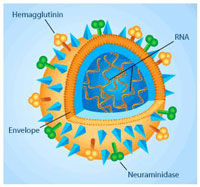Chemokine Therapeutics: Identification of Mechanism for Blood Vessel Growth
Chemokine Therapeutics Corp. announced the publication of an article in Nature medicine, authored by clinical advisory board member and collaborator, Dr. Shahin Rafii of the Weill Medical College of Cornell University, and co-authored by Dr. Hassan Salari, President and CEO of Chemokine Therapeutics.
"More than 200,000 individuals undergo various costly treatments for diseases associated with abnormal vascularization, such as Age-related Macular Degeneration (AMD). Vascularization is a process believed to involve local production of a group of growth factors, cytokines and chemokines. An excess amount of these growth factors leads to abnormal growth of endothelial cells which form new blood vessels. In the article, the team concludes that in the limb ischemia revascularization model, the chemokine SDF-1 is a hub for most growth factors and, without it, there is reduced revascularization, even if other growth factors are present. The discoveries point to the need for the development of SDF-1 inhibitors as a mean to stop unwanted vascularization of tissues and organs. SDF-1 inhibitors may have even greater potential than currently used anti-cytokine/growth factor therapies," stated Dr. Hassan Salari, President and CEO.
The discoveries were made possible in part through the use of a novel SDF-1 antagonist, CTCE-0012 produced by Chemokine Therapeutics. It was shown that CTCE-0012 is as powerful as antibodies to CXCR4, however with the benefits of being a most closely homolog of natural SDF-1 protein which might be used chronically. CTCE-0012 is a powerful inhibitor of SDF-1 and prevents revascularizarion of tissues, leading to a lower number of new blood vessels. This discovery leads the way to the development of CTCE-0012 for diseases that are initiated through excess vascularization, such as Macular Degeneration, etc.
Original publication: "Cytokine-mediated deployment of SDF-1 induces revascularization through recruitment of CXCR4+ hemangiocytes" Nature Medicine 12006, 2(5):557-567.
Most read news
Topics
Organizations
Other news from the department science

Get the analytics and lab tech industry in your inbox
By submitting this form you agree that LUMITOS AG will send you the newsletter(s) selected above by email. Your data will not be passed on to third parties. Your data will be stored and processed in accordance with our data protection regulations. LUMITOS may contact you by email for the purpose of advertising or market and opinion surveys. You can revoke your consent at any time without giving reasons to LUMITOS AG, Ernst-Augustin-Str. 2, 12489 Berlin, Germany or by e-mail at revoke@lumitos.com with effect for the future. In addition, each email contains a link to unsubscribe from the corresponding newsletter.
More news from our other portals
See the theme worlds for related content
Topic world Antibodies
Antibodies are specialized molecules of our immune system that can specifically recognize and neutralize pathogens or foreign substances. Antibody research in biotech and pharma has recognized this natural defense potential and is working intensively to make it therapeutically useful. From monoclonal antibodies used against cancer or autoimmune diseases to antibody-drug conjugates that specifically transport drugs to disease cells - the possibilities are enormous

Topic world Antibodies
Antibodies are specialized molecules of our immune system that can specifically recognize and neutralize pathogens or foreign substances. Antibody research in biotech and pharma has recognized this natural defense potential and is working intensively to make it therapeutically useful. From monoclonal antibodies used against cancer or autoimmune diseases to antibody-drug conjugates that specifically transport drugs to disease cells - the possibilities are enormous


























































